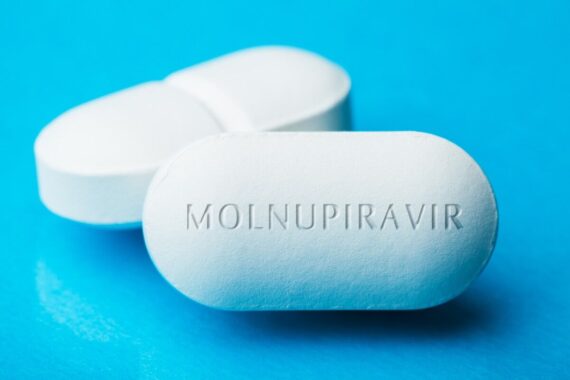No reduction in hospitalisation or death from Covid treatment molnupiravir

An antiviral drug that the UK Government purchased millions of doses of has been shown not to reduce the risk of severe outcomes in at-risk patients in a major UK trial.
A preliminary analysis of results from the PANORAMIC study showed no difference in hospitalisation or deaths in patients who had taken molnupiravir.
But those who had received the five-day course of treatment recovered more quickly and had reduced viral load, the researchers led by Oxford University reported in a pre-print.
Data from more than 25,000 patients aged over 50 or over 18 with co-morbidities with mild or moderate confirmed Covid, randomised to usual care or the antiviral treatment, found that 0.8% of patients in both groups were admitted to hospital or died in the first 28 days.
However, the median time to first recovery as reported by the patients was nine days with molnupiravir compared with 15 days with usual care.
And on day seven, SARS-CoV-2 virus was below detection in 21% of samples looked at in the antiviral group compared with 3% in the usual care group.
Almost all participants had also had at least one Covid vaccination, the researchers reported, and subgroup analyses showed the same results.
PANORAMIC is the largest randomised trial of Covid-19 novel antivirals to date, the researchers said, with 90% of patients reporting starting treatment within five days of their symptoms starting.
Analysis is ongoing to look at the longer-term economic implications of the use of molnupiravir as well as any impact on the development of long Covid, the researchers said.
NICE is also assessing the clinical and cost-effectiveness of the drug, the Department of Health and Social Care (DHSC) confirmed.
The researchers concluded: ‘This preliminary analysis involving people vaccinated against SARS-CoV-2 infection at increased risk of an adverse outcome in the community and unwell with Covid-19 found that molnupiravir did not reduce already low hospital admission, but that molnupiravir resulted in faster time to recovery, earlier sustained recovery, reduced contact with GP services, and reduced viral detection and viral load.
‘These benefits need to be considered in the context of the prevailing disease, burden on healthcare services, social circumstances, cost-effectiveness and opportunity costs.’
A DHSC spokesperson said: ‘The UK is a world leader in the delivery of clinical research, as shown by the speed of this record-breaking trial, and our priority continues to be finding effective treatments for those most vulnerable to Covid-19.
‘Molnupiravir will continue to be available to high-risk patients, alongside other medicines, free testing and vaccination, as it speeds up recovery time and reduces the amount of virus in patients.
‘We look forward to seeing the final, peer-reviewed data when it is published.’
Professor Azeem Majeed, a GP and professor of primary care and public health at Imperial College London, said: ‘It’s essential for clinically vulnerable people to ensure they are fully vaccinated, including with boosters, as this will substantially reduce the risk of hospitalisation and death – more so than antiviral drugs.’
He added: ‘In terms of clinical impact, the shortened time to recovery with molnupiravir will be helpful for patients and the economy but the lack of impact on outcomes such as hospitalisation will limit the NHS benefits.’
The PANORAMIC study is still open and studying Paxlovid which was added to the trial in April this year.
As of December, vulnerable patients in the community have been able to access antivirals and monoclonal antibody treatments against Covid-19, with those eligible directed to local NHS Covid Medicines Delivery Units (CMDUs).
GPs have also been able to refer suitable patients for antiviral treatment via the PANORAMIC study.
Pulse October survey
Take our July 2025 survey to potentially win £1.000 worth of tokens

Visit Pulse Reference for details on 140 symptoms, including easily searchable symptoms and categories, offering you a free platform to check symptoms and receive potential diagnoses during consultations.











